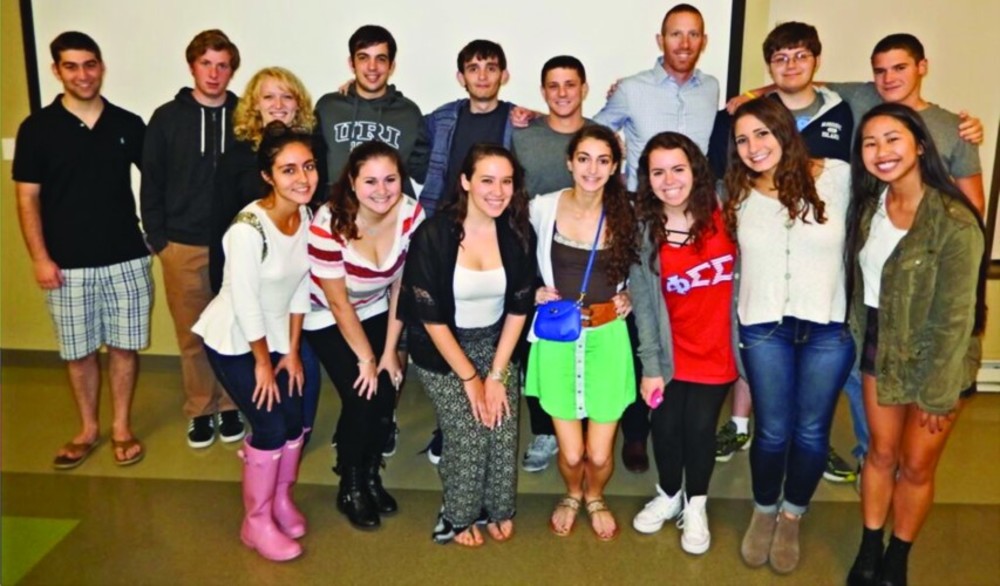Basketball was no slam dunk for ‘the Jewish Jordan’
 Tamir Goodman, back row, third from right, with University of Rhode Island students at the Norman M. Fain Hillel Center on Oct. 14. /PHOTO | URI
Tamir Goodman, back row, third from right, with University of Rhode Island students at the Norman M. Fain Hillel Center on Oct. 14. /PHOTO | URI
KINGSTON, R.I. – Students walking into the Norman M. Fain Hillel Center at the University of Rhode Island to hear Tamir Goodman speak on Oct. 14 might not have immediately noticed the man once dubbed “the Jewish Jordan” by Sports Illustrated. And it’s not because the 6-foot-3 redhead cannot command a room, but because he was surrounded by students, Hillel staff and community members who had come to hear the former basketball superstar speak.
But once Goodman, 33, began his presentation, his presence was certainly known. Everyone in the room, regardless of sports appreciation or religious background, became caught up in his history.
Goodman first spoke about growing up in Maryland in an Orthodox Jewish home. From the start, he had a passion for basketball, but his peers cautioned him that success would be difficult due to his inability to practice and play the sport on Shabbat. Goodman never let the negative remarks deter him and, with the strength of his faith and the support of his family, he reached heights his peers never dreamed possible.
During his junior year in high school, Goodman was one of the top 25 high school players in the United States, which got the attention of the University of Maryland basketball program. He was offered a full scholarship to the university but, due to his religious constraints, he turned it down.
The attention he received from major college sports programs created national interest in Goodman. Overnight, he became a star, receiving more than 700 requests from local and national media outlets. The most notable came from Sports Illustrated, which published an article and photos of the 17-year-old and dubbed him “the Jewish Jordan.” During his senior year of high school, Goodman accepted a scholarship from Towson University, which promised to accommodate his religious needs.
Goodman flourished his freshman year, despite the intensity of the Towson basketball program. But the coach was fired at the end of his freshman year and the new coach did not give Goodman the flexibility he needed to respect his religious beliefs.
Goodman’s lifelong dream was in jeopardy. He said that when he left the team, and basketball, he didn’t feel like himself. He eventually started practicing again and it was not long before opportunity struck.
In 2002, Goodman was invited to play professional basketball in Israel, and he jumped at the chance. While visiting children at an Israeli hospital, he met a woman who would become his wife. He played successfully for a few years, but in 2004 he had a string of injuries that forced him to retire at age 27.
Goodman says his injuries helped him redefine success. After his professional basketball career ended, he would invent sports-friendly tzitzit, volunteer with children at basketball camps around the world, write a book,and invent a National Basketball Association-accredited training product, the Zone 190.
“That’s the beauty of sport, the beauty of basketball – it brings everyone together more than anything else in the world,” Goodman said during his speech, adding that the sport has connected him to many others around the world and allowed him to share his story of perseverance and faith.
JOSEPHINE MAIDA a junior at URI. She is the vice president of PRSSA and the public relations intern at the URI Hillel Center.







